The Photorejuvenation Equipment Market is estimated to be valued at USD 2.6 billion in 2025 and is projected to reach USD 4.9 billion by 2035, registering a compound annual growth rate (CAGR) of 6.4% over the forecast period.
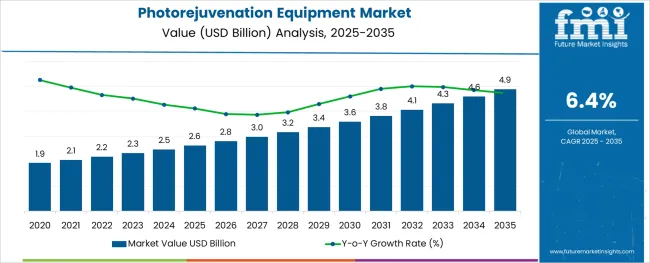
The photorejuvenation equipment market is growing steadily as demand rises for non-invasive skin treatments aimed at improving skin texture and appearance. Increasing awareness about cosmetic procedures and the growing preference for minimally invasive therapies have expanded the adoption of photorejuvenation technologies. Dermatology clinics have been investing in advanced equipment to meet patient demand for treatments targeting pigmentation, redness, and skin aging.
Technological improvements have enhanced device safety and effectiveness, encouraging broader use in clinical settings. Rising disposable incomes and the influence of social media promoting aesthetic wellness have further fueled market growth.
The development of standalone photorejuvenation systems that offer ease of use and targeted results is also supporting expansion. Overall, market growth is driven by innovations in treatment modalities, expanding clinic infrastructure, and patient preference for outpatient cosmetic care.
The market is segmented by Product Type, End User, and Modality and region. By Product Type, the market is divided into Intense Pulse Light (IPL), Laser Equipment, Ablative Fractional Laser, CO2 Laser, Erbium YAG Laser, Non-Ablative Fractional Laser, Nd: YAG Laser, Er: Glass Laser, Others, and LED Equipment. In terms of End User, the market is classified into Dermatology Clinics, Hospitals, Wellness Centres, Laser Therapy Centres, and Home Care Settings.
Based on Modality, the market is segmented into Standalone Photorejuvenation Equipment and Handheld/Portable Photorejuvenation Equipment. Regionally, the market is classified into North America, Latin America, Western Europe, Eastern Europe, Balkan & Baltic Countries, Russia & Belarus, Central Asia, East Asia, South Asia & Pacific, and the Middle East & Africa.
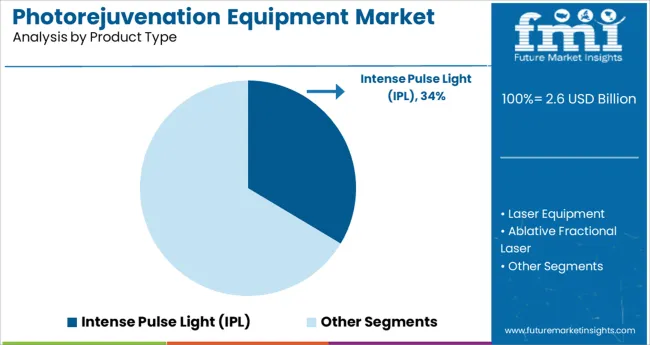
The Intense Pulse Light (IPL) segment is projected to hold 33.6% of the photorejuvenation equipment market revenue in 2025, maintaining its position as the leading product type. IPL has been preferred for its versatility in treating a variety of skin concerns including pigmentation, vascular lesions, and textural irregularities. Its non-ablative nature allows for effective treatments with minimal downtime, making it appealing to a wide patient demographic.
Clinicians favor IPL due to its customizable settings and ability to address multiple skin types and conditions with a single device. Continued innovations improving pulse delivery and safety features have reinforced its use.
IPL’s established clinical efficacy and patient acceptance contribute to its sustained market leadership.
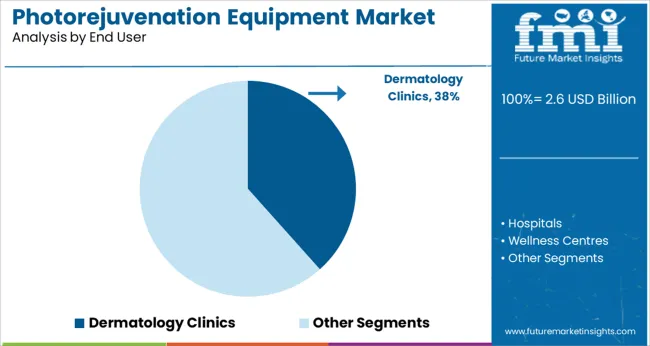
Dermatology clinics are projected to account for 38.4% of the photorejuvenation equipment market revenue in 2025, holding the largest share among end users. Growth in this segment has been driven by the increasing number of dermatology practices offering cosmetic and aesthetic treatments as part of their service portfolio. Clinics provide specialized care with trained practitioners and have incorporated photorejuvenation technologies to meet rising patient demand for skin rejuvenation procedures.
The segment benefits from growing patient awareness, insurance coverage for certain skin conditions, and expanded clinic networks in urban and semi-urban areas.
As outpatient procedures become more popular, dermatology clinics remain central to the adoption and usage of photorejuvenation equipment.
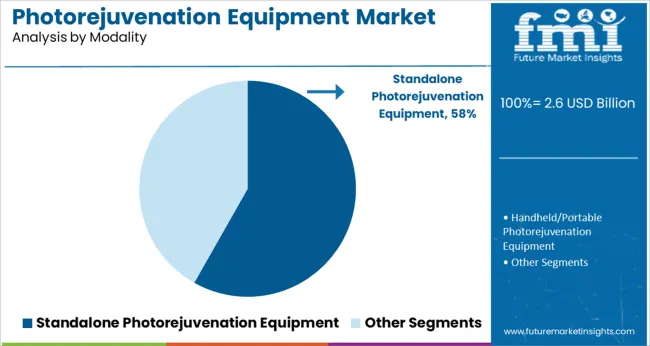
The standalone photorejuvenation equipment segment is projected to hold 58.2% of the market revenue in 2025, establishing it as the dominant modality. This growth has been driven by the preference for devices dedicated solely to photorejuvenation, which offer optimized performance and ease of operation. Standalone units simplify clinical workflows by focusing on specific treatment goals without the complexity of multifunction systems.
The ability to provide consistent, targeted results with these devices has made them attractive to dermatology clinics and aesthetic centers. Their compact designs also facilitate installation in smaller practice settings.
As demand for specialized cosmetic procedures rises, standalone photorejuvenation equipment is expected to continue leading the market.
Continuously growing awareness among people about non-invasive surgeries with lesser side effects compared to surgeries is increasing the adoption of non-invasive photorejuvenation equipment. Furthermore, Non-invasive photorejuvenation treatment with lasers, intense pulsed light (IPL) and LED equipment reduces the hospital stay and provides faster recovery.
Nonsurgical dermatological surgery are commonly performed as standalone treatments, or as a complementary to aesthetic surgery to address a broad range of concerns. Some common approaches include collagen induction therapy (CIT), platelet-rich plasma (PRP) and autologous fat transfer (AFT).
Combined laser therapy is found to be very effective for tattoo removal. The usage of a single laser has certain limitations like ink retention even after multiple sessions, incomplete clearance of the tattoo, and long treatment duration with large interval gap between sessions, and in certain cases, blistering and dyschromia.
These limitations can be overcome through the use of combined treatment modes such as combined laser therapies and increases the demand of photorejuvenation equipment. For instance, combination of fractional laser with Q-switched laser has been proved to reduce side effects such as blistering, minimize number of sessions required for treatment and yield faster clearing of tissue.
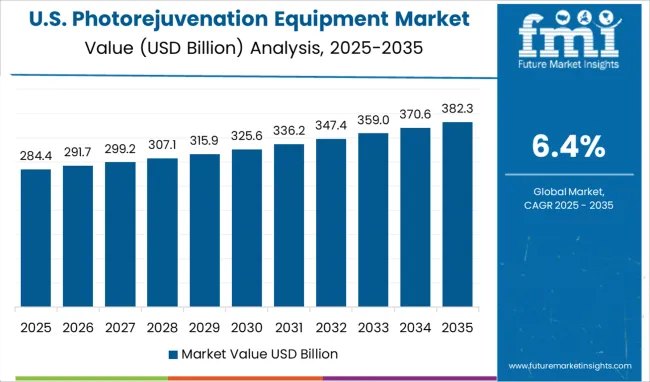
The market for photorejuvenation is likely to generate 22.0% revenue across North America, according to Future Market Insights. This demand is primarily being pushed by increased awareness about maintaining good skin health amongst the population. This is largely an outcome of rising dermatological disorders prevalence.
According to the American Academy of Dermatology Association, acne is the most common skin condition in the United States, affecting up to 50 million people annually. Approximately 85% people aged 12-24 experience at least minor acne. Hence, patients are increasingly opting for intense pulsed light (IPL) based photorejuvenation due to its reduced downtime.
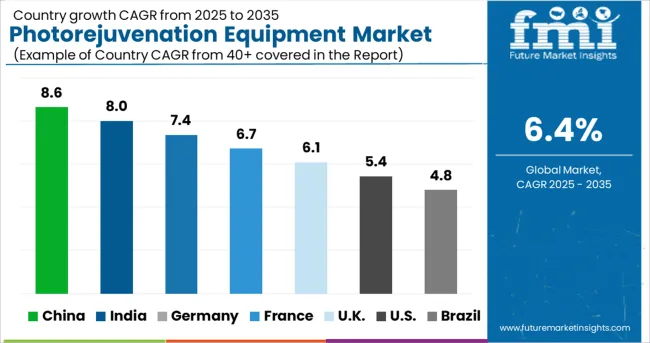
Europe has been witnessing an increase in cosmetic and aesthetic surgical procedures by patients, especially for skin enhancement. There is extensive reliance on non-invasive aesthetic treatments, as they leave minimal or no scars, reduced downtime and relative inexpensiveness.
The continent has been experiencing an increase in the proportion of ageing population, with a majority of them belonging to the age group of 50 to 65 and above. Hence, the proportion of skin enhancement procedures to look younger is rising. As per FMI, 28.1% of photorejuvenation revenue will be generated by Europe in 2025.
By product type, non-ablative Nd: YAG laser photorejuvenation equipment are expected to register maximum sales in 2025 and beyond. This is attributed to a high degree of uptake of non-ablative laser resurfacing techniques by patients.
Studies have concluded that this approach to photorejuvenation yield high success rates, with minimal downtime. Also, Nd: YAG lasers have proven effective in producing new collagen formation in the papillary dermis, thus helping improve skin tone and color.
Given the increasing incidence of dermatological disorders, a high percentage of patients are seeking out specialized dermatological centres for effective treatment. Hence, use of photorejuvenation equipment is likely to accelerate across dermatological centres across the forthcoming decade.
Simultaneously, hospitals will continue to remain the primary point of contact for availing advanced dermatological treatment options. This is expected to retain expansion prospects for photorejuvenation equipment across this segment.
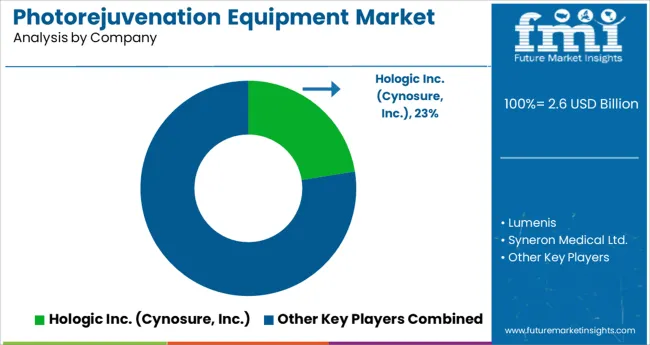
Prominent photorejuvenation equipment manufacturers are emphasizing on growth strategies such as acquisition of existing small and medium scale players, as well as consolidation of their presence via extensive seasonal marketing campaigns
| Attribute | Details |
|---|---|
| Forecast Period | 2025 to 2035 |
| Historical Data Available for | 2013 to 2024 |
| Market Analysis | million for Value |
| Key Regions Covered | North America; Latin America; Europe; South Asia and Pacific; East Asia; Middle East and Africa |
| Key Countries Covered | USA, Canada, Brazil, Mexico, Germany, UK, France, Spain, Italy, Russia, Poland, China, Japan, South Korea, India, ASEAN, Australia, New Zealand, South Africa, GCC |
| Key Market Segments Covered | Product, Modality, End User, Region |
| Key Companies Profiled | Hologic Inc. (Cynosure Inc.); Lumenis; Syneron Medical Ltd.; Lynton Lasers Ltd; EN S.p.A. (Deka Mela S.r.l.); Fotona; Cutera Inc.; Lutronic Corporation; Beijing Nubway S & T Co. Ltd |
| Pricing | Available upon Request |
The global photorejuvenation equipment market is estimated to be valued at USD 2.6 billion in 2025.
It is projected to reach USD 4.9 billion by 2035.
The market is expected to grow at a 6.4% CAGR between 2025 and 2035.
The key product types are intense pulse light (ipl), laser equipment, ablative fractional laser, co2 laser, erbium yag laser, non-ablative fractional laser, nd: yag laser, er: glass laser, others and led equipment.
dermatology clinics segment is expected to dominate with a 38.4% industry share in 2025.






Full Research Suite comprises of:
Market outlook & trends analysis
Interviews & case studies
Strategic recommendations
Vendor profiles & capabilities analysis
5-year forecasts
8 regions and 60+ country-level data splits
Market segment data splits
12 months of continuous data updates
DELIVERED AS:
PDF EXCEL ONLINE
Equipment Management Software Market Size and Share Forecast Outlook 2025 to 2035
Equipment cases market Size and Share Forecast Outlook 2025 to 2035
Farm Equipment Market Forecast and Outlook 2025 to 2035
Golf Equipment Market Size and Share Forecast Outlook 2025 to 2035
Port Equipment Market Size and Share Forecast Outlook 2025 to 2035
Pouch Equipment Market Growth – Demand, Trends & Outlook 2025 to 2035
Garage Equipment Market Forecast and Outlook 2025 to 2035
Mining Equipment Industry Analysis in Latin America Size and Share Forecast Outlook 2025 to 2035
Subsea Equipment Market Size and Share Forecast Outlook 2025 to 2035
Pavers Equipment Market Size and Share Forecast Outlook 2025 to 2035
Tennis Equipment Market Analysis - Size, Share, and Forecast Outlook 2025 to 2035
Galley Equipment Market Analysis and Forecast by Fit, Application, and Region through 2035
Sorting Equipment Market Size and Share Forecast Outlook 2025 to 2035
General Equipment Rental Services Market Size and Share Forecast Outlook 2025 to 2035
Bagging Equipment Market Size and Share Forecast Outlook 2025 to 2035
RF Test Equipment Market Size and Share Forecast Outlook 2025 to 2035
Medical Equipment Covers Market Size and Share Forecast Outlook 2025 to 2035
Telecom Equipment Market Size and Share Forecast Outlook 2025 to 2035
Welding Equipment And Consumables Market Size and Share Forecast Outlook 2025 to 2035
Hunting Equipment and Accessory Market Analysis - Size, Share, and Forecast Outlook 2025 to 2035

Thank you!
You will receive an email from our Business Development Manager. Please be sure to check your SPAM/JUNK folder too.
Chat With
MaRIA